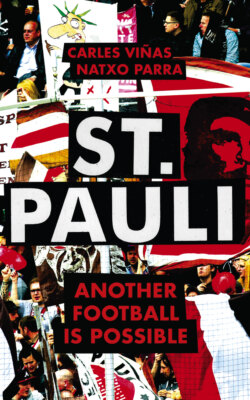Читать книгу St. Pauli - Carles Vinas - Страница 8
Foreword
ОглавлениеOften I have been asked what is it that drives me to run after a ball for 90 minutes and what I hope to achieve by doing so. Having been born the son of some simple Kurdish economic migrants in the heart of Germany made me aware from very early on about what class society means. From an early age I wanted to be ‘something’. I could only dream of obtaining the fruits of wealth through the seed of football – a truly simple pastime.
Over time, I became a focus of people’s attention. I am more aware now than ever that true wealth does not lie in football or the benefits or gifts provided by professional status, nor are they anything material. I have lived and learned, particularly in the period that I played at St. Pauli, that fraternity and solidarity among teammates but also with rivals can be an incredible strength. I saw that when we stand our ground backing each other up, nothing could beat us.
This team – the pride of true Hamburgers1 – taught me that borders only exist in our minds. It taught me what it means for people to support each other and to play for our teammates, coach, fans, and particularly the ticket sellers in the stadium. It taught me to be able to provide a positive experience for each of them. I no longer played just for me but for everyone. And everyone – from car-park attendants to team captain – makes the same contribution to achieving success.
Since my time at St. Pauli, I have continued to extend my motivation beyond the playing field. I try to use my platform in the media so that kids watching have a positive role model to identify with, and to draw people’s attention to crimes against humanity that are taking place. My aim is to bring a smile back to the faces of those suffering. Since playing for Amedspor,2 I have been keener than ever to fight for these aims. I went with great enthusiasm to Amed, a city with a long history and walls as marvellous as its inhabitants. Both its walls and people have stood firm since eternity and form symbols of the fraternity between the different cultures that co-exist there. Yet in Amed children are dying and adults are butchered and imprisoned. And all of this is painful, really painful.
I wish to oppose and resist any form of oppression. With all of the resources I have at my disposal. Despite the repression suffered, I shall continue rebelling and not give in. The last thing they can take from me is my soul and my longing for freedom. St. Pauli taught me that the better I play with the team on the field, the more I can achieve. In Amed, I came across a lot of solidarity among its warm and affectionate people. I met proud people who resist out of dignity. I have learned a great deal from Amedspor, maybe the Kurdish St. Pauli, and will continue to do so.
Deniz Naki
_______________
1. [Translator’s note]: inhabitants of Hamburg
2. [Translator’s note]: a team associated with the Kurdish people
